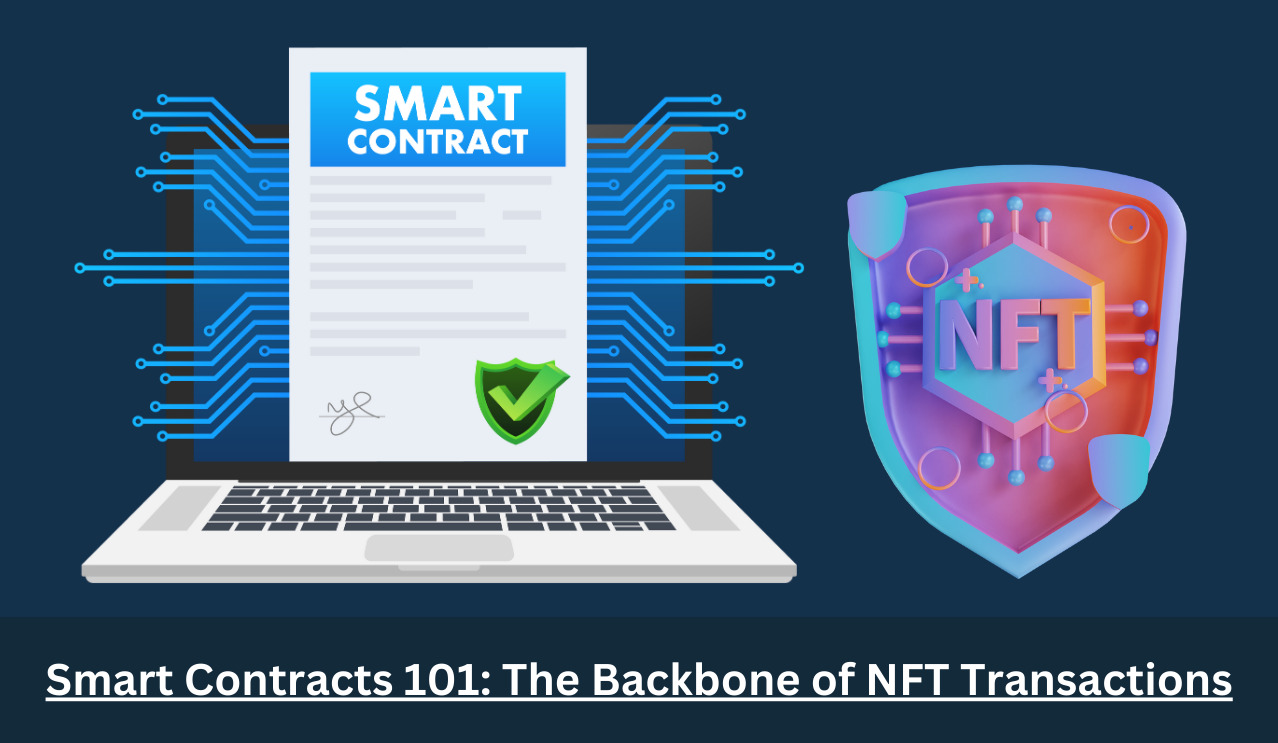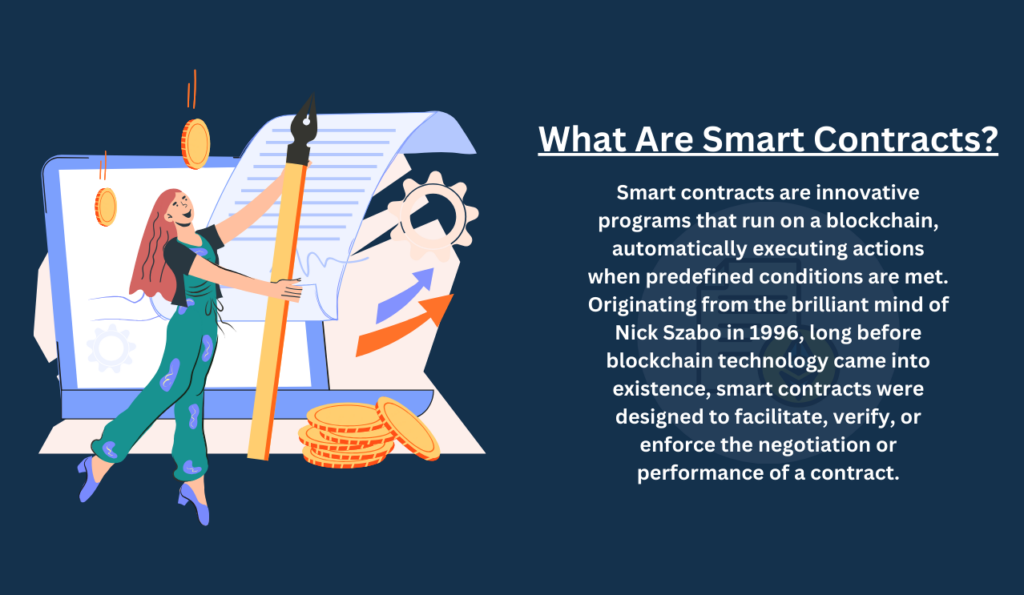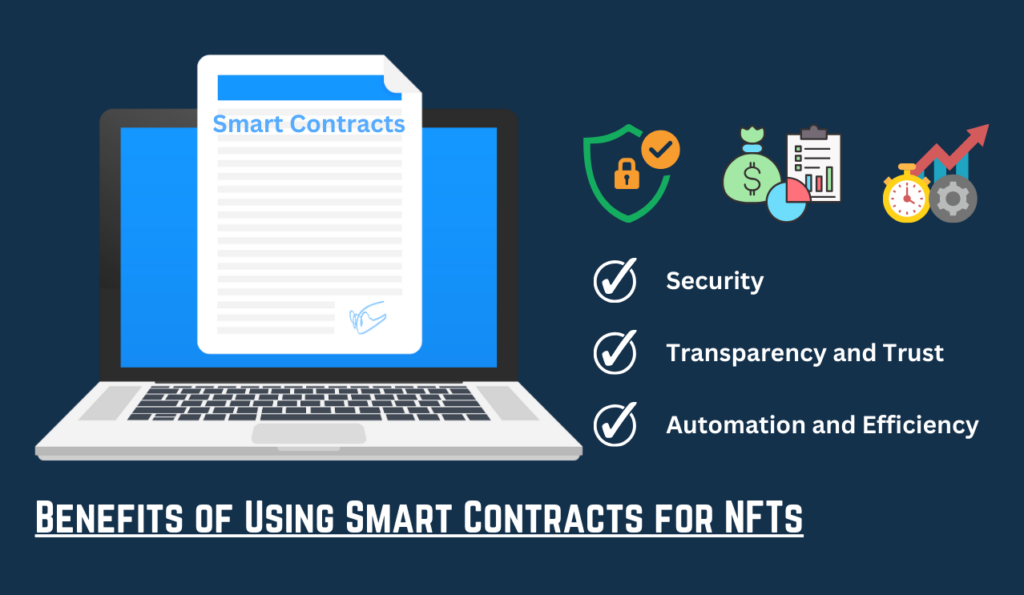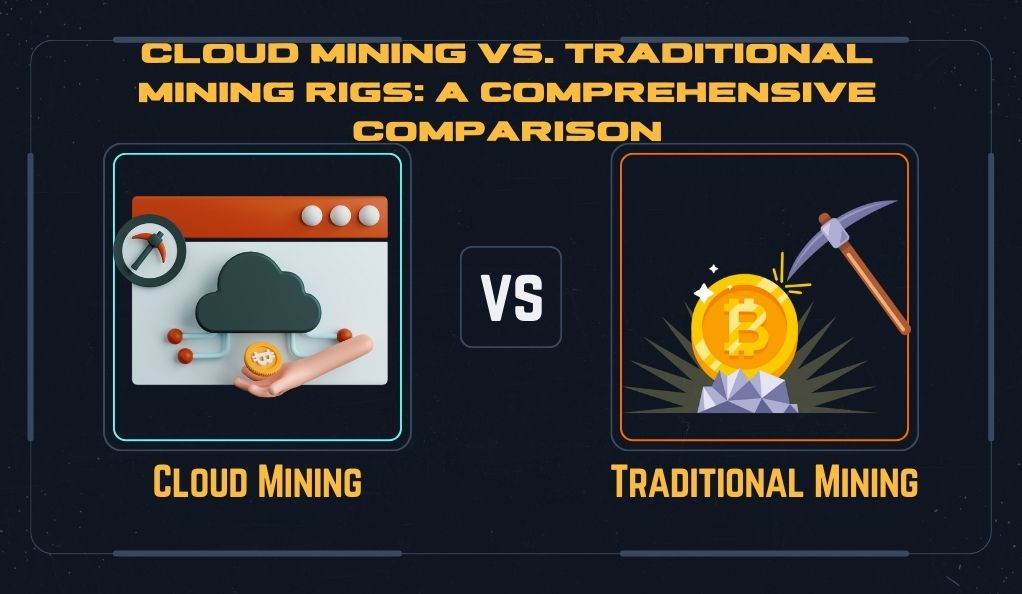
In recent years, the world of digital art and collectibles has undergone a paradigm shift, giving rise to a new asset class called Non-Fungible Tokens, or NFTs. These unique digital tokens, unlike their fungible counterparts such as Bitcoin or Ethereum, represent ownership of a specific item or piece of content on the blockchain.
While the concept of NFTs is fascinating and promises to revolutionize various sectors, their creation, purchase, and transfer wouldn’t be possible without the integral role played by smart contracts. Understanding smart contracts is not just a task for tech aficionados; it’s crucial for anyone involved in or interested in the NFT ecosystem.
| Properties | Description |
|---|---|
| Uniqueness | Each NFT has a distinct value and cannot be exchanged on a one-to-one basis. |
| Indivisibility | NFTs cannot be divided into smaller units and sold. |
| Provenance | Track and verify the ownership and authenticity of items. |
| Interoperability | Can be used across different applications and platforms. |
In the vast and ever-evolving world of digital collectibles, one might wonder how it’s possible to ensure that an NFT is genuine, remains indivisible, and belongs to a particular owner. The answer lies in the realm of smart contracts.
A Sneak Peek into Smart Contracts
A smart contract is a self-executing contract where the terms of the agreement or conditions are written into lines of code. They are stored and replicated on the blockchain, making them transparent, tamper-proof, and irreversible. Essentially, these contracts automatically execute actions when predetermined conditions are met, removing the need for intermediaries and ensuring a high level of security and trust.
For instance, consider a scenario where an artist wants to sell a digital artwork as an NFT. The artist can set up a smart contract that states: “When someone transfers ‘X’ amount of Ethereum to my account, they will automatically receive the NFT representing my artwork.” Once the buyer sends the specified Ethereum amount, the smart contract immediately and autonomously ensures the transfer of the NFT to the buyer’s digital wallet.
What Are Smart Contracts?

Smart contracts are innovative programs that run on a blockchain, automatically executing actions when predefined conditions are met. Originating from the brilliant mind of Nick Szabo in 1996, long before blockchain technology came into existence, smart contracts were designed to facilitate, verify, or enforce the negotiation or performance of a contract.
Understanding the Mechanism
At their core, smart contracts are composed of lines of code and are stored within a blockchain. When the conditions coded into the contract are met, the contract automatically carries out the agreed-upon actions. These actions could include transferring assets between parties, releasing funds, or registering ownership of a digital item, such as an NFT.
Transparency and Immutability
Once a smart contract is deployed to the blockchain, its code and the data stored in it become transparent and immutable. This means that anyone can verify the contract’s code and its functions, but no one can alter it, not even the original creator. This immutability ensures a high level of security and trust in the contract’s execution.
Self-Execution and Decentralization
The decentralized nature of blockchain technology means that smart contracts operate in a trustless environment. They do not require intermediaries to facilitate transactions or ensure that parties uphold their end of the deal. The blockchain network collectively validates and executes the smart contract, ensuring fairness and reliability.
The Role of Smart Contracts in NFT Transactions
Smart contracts are the engine behind every NFT transaction, ensuring that the process is secure, transparent, and efficient. From the creation of an NFT to its purchase and eventual transfer, smart contracts play a crucial role at every stage.
Facilitating NFT Creation
When an artist or creator decides to tokenize their artwork or any other digital item as an NFT, they interact with a smart contract to mint the NFT. The smart contract verifies the uniqueness of the item, registers its ownership, and creates a unique token on the blockchain.
Ensuring Secure Transactions
Buying and selling NFTs involve transferring ownership of the token from one digital wallet to another. Smart contracts automate this process, executing the transfer once the buyer meets the seller’s conditions, such as paying the agreed-upon price. This automation ensures that the transaction is secure and the ownership transfer is instantaneous.
Maintaining Provenance and Authenticity
One of the key value propositions of NFTs is their ability to prove authenticity and ownership history. Smart contracts maintain a transparent and immutable record of all transactions associated with an NFT, ensuring that its provenance is easily verifiable.
Benefits of Using Smart Contracts for NFTs

The integration of smart contracts in NFT transactions offers a multitude of benefits, enhancing the security, efficiency, and trustworthiness of the digital collectibles market.
Security
With smart contracts, the terms of the transaction are embedded in the code and executed automatically. This automation eliminates the risk of fraud and ensures that the contract is executed exactly as agreed upon.
Transparency and Trust
The transparency of blockchain technology means that all parties can verify the terms and execution of a smart contract. This transparency builds trust among parties, even in the absence of intermediaries.
Automation and Efficiency
Smart contracts automate the execution of contracts, reducing the need for manual intervention and minimizing the risk of errors. This automation not only speeds up the transaction process but also ensures that it is more efficient and reliable.
Challenges and Considerations
While smart contracts offer numerous benefits, they are not without their challenges and complexities. Understanding these is crucial for anyone looking to navigate the world of NFTs and blockchain technology.

Common Challenges
- Code Vulnerabilities: Smart contracts are only as good as the code they are written in. If there are any bugs or vulnerabilities in the code, it could lead to unintended consequences, including the loss of assets.
- Scalability: As the popularity of NFTs and smart contracts continues to grow, the issue of scalability becomes more prevalent. Ensuring that the network can handle a large number of transactions without compromising speed or security is a significant challenge.
- Gas Fees: Every interaction with a smart contract on a blockchain network requires a transaction fee, known as a gas fee. During times of high demand, these fees can become prohibitively expensive, potentially deterring users.
Legal and Regulatory Considerations
The legal landscape surrounding smart contracts and NFTs is still evolving. Different jurisdictions may have varying regulations, and navigating this complex legal environment requires diligence and awareness.
Contractual Validity: In some jurisdictions, the legal status of smart contracts is still unclear. Questions surrounding their enforceability and the remedies available in case of a breach remain open.
Intellectual Property Rights: When it comes to NFTs, understanding the intellectual property rights associated with the digital asset is crucial.
Addressing the Challenges
To mitigate these challenges, it’s important to conduct thorough research and due diligence. Engaging with reputable platforms, seeking legal advice, and ensuring smart contracts are audited for security vulnerabilities are key steps in navigating these complexities.
Creating and Implementing Smart Contracts for NFTs
Creating a smart contract for NFT transactions requires a careful approach, ensuring that the code is secure, efficient, and aligns with the intended functionality.
Step-by-Step Guide
- Define the Requirements: Clearly outline what the smart contract needs to achieve, including the conditions for execution and the actions to be taken.
- Choose a Blockchain Platform: Select a blockchain platform that supports smart contracts. Ethereum is the most popular choice for NFTs, but other options are available.
- Write the Code: Use a programming language compatible with your chosen blockchain to write the smart contract code. Solidity is widely used for Ethereum smart contracts.
- Test the Contract: Before deploying the smart contract, test it rigorously to ensure it functions as intended and is free from vulnerabilities.
- Deploy the Contract: Once tested, deploy the smart contract to the blockchain. This will make it live and executable.
Tools and Platforms
Several tools and platforms are available to aid in the creation, testing, and deployment of smart contracts.
- Remix: A popular web-based IDE for writing and testing Solidity smart contracts.
- Truffle: A development environment, testing framework, and asset pipeline for blockchains using the Ethereum Virtual Machine (EVM).
- OpenZeppelin: A library of secure and community-vetted smart contracts that can be used as building blocks.
Future of Smart Contracts in NFTs and Beyond
The world of smart contracts and NFTs is rapidly evolving, with new developments and applications emerging regularly.
Emerging Trends
- Cross-Chain Functionality: The development of smart contracts that can interact across different blockchain networks is a growing trend, enhancing interoperability and flexibility.
- Upgradable Smart Contracts: Innovations in smart contract design are leading to contracts that can be upgraded after deployment, addressing the challenge of immutability.
Impact on the NFT Market
The continued evolution of smart contracts will undoubtedly shape the future of the NFT market, making transactions more secure, efficient, and user-friendly.
Innovation and Community
The role of innovation and community engagement cannot be overstated. Developers, users, and enthusiasts collectively contribute to the development and improvement of smart contracts, driving the technology forward.
Conclusion
Smart contracts stand as the technological backbone of NFT transactions, providing security, transparency, and efficiency. They automate and streamline the process of creating, buying, and selling digital assets, ensuring the integrity of every transaction. As the world of NFTs continues to grow and evolve, so too will the technology that underpins it, promising an exciting future for digital ownership and blockchain technology.

